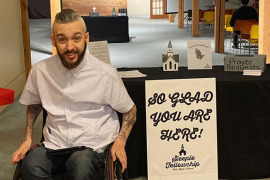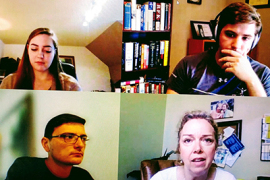Dealing with Anxiety and Panic Attacks: 5 Tips for Getting Through the Work Day
For those who struggle with anxiety and panic attacks, simply getting through a work day can be tough. From dealing with difficult coworkers and demanding bosses to meeting deadlines and making presentations, the stressors that come along with a work environment are often overwhelming.
Experiencing stress at work is perfectly normal and can happen to anyone; there’s no such thing as a worry-free life. Yet, anxiety disorders, or living in a continual state of anxiousness and emotional distress, are very real issues and can leave sufferers feeling lonely, isolated, and hopeless.
According to statistics, anxiety disorders are incredibly common, affecting 40 million adults — or 18.1% of the population every year. Chronic job-related stress, another survey found, affects more than one-third of working Americans, yet just 36 percent said their organizations provide sufficient resources to help them manage that stress.
If you are one of the millions of Americans who suffer from anxiety and panic attacks, here are five tips to help you get through your workday.
1. Learn Your Triggers
Identifying the things that trigger your anxiety can help you proactively fight an oncoming panic attack — the physical response to stress. Is it finances, looming deadlines, or piles of paperwork? Keep a record of when you’re feeling stressed, overwhelmed, or anxious, and then pay attention to your symptoms and identify patterns.
Once you identify your patterns, you can make rational, informed decisions about what to do with your anxiety instead of letting it cascade into a full-blown panic attack. Oftentimes, it’s possible to reduce stress by preventing a trigger from turning into worse anxiety.
2. Practice Self-care
Instead of self-medicating through unhealthy ways, practice mindful and constructive self-care. Make sure you get sufficient rest, eat nutritious foods that keep your blood sugar steady, and take time to engage in exercises that relax your body.
A recent study showed that those who regularly exercise were 25 percent less likely to develop depression or an anxiety disorder over the next five years. The Anxiety and Depression Association of America (ADAA) recommends including at least 2½ hours of moderate-intensity physical activity each week, 1¼ hours of a vigorous-intensity activity (such as jogging or swimming laps), or a combination of the two.
Additionally, the ADAA advises limiting both alcohol and caffeine, as both can aggravate anxiety and trigger panic attacks.
Finally, be intentional about what you watch on TV, read, or listen to. Carefully consider the thoughts you allow to run through your mind. Do they worsen your anxiety? Philippians 4:8 says this: “Finally, brothers and sisters, whatever is true, whatever is noble, whatever is right, whatever is pure, whatever is lovely, whatever is admirable—if anything is excellent or praiseworthy—think about such things.”
3. Take a Break
The idea of taking a break during a busy workday can seem counterintuitive when tasks continue to pile up. Yet, to avoid getting over-stressed, experts advise taking two 15-minute “relaxation breaks” in the day.
During these breaks, practice stress-management techniques like meditation, prayer, or reading — all of which can help diminish anxiety. The Bible is full of full of wisdom and encouragement for those suffering from anxiety disorders. Philippians 4:6-7 says, “Do not be anxious about anything, but in everything by prayer and supplication with thanksgiving let your requests be made known to God. And the peace of God, which surpasses all understanding, will guard your hearts and your minds in Christ Jesus.” Similarly, God encourages us to “Cast all your anxiety on Him because He cares for you” (1 Peter 5:7).
When anxiety begins to creep in, make a conscious effort to listen to your body’s stress signals and briefly remove yourself from the situation to clear your head. Take a few deep breaths, go for a walk, relax, and renew your mind.
4. Set Attainable Goals
Anxiety can make its sufferers forget their successes and achievements, constantly feeding them the lie that they aren’t good or accomplished enough.
A key way to avoid anxiety during the day is to work within your limits. Instead of powering through a project and becoming frustrated, pace yourself and set realistic, attainable goals. Make a physical list and cross off each task as you complete it. It’s easier to motivate yourself and remain mentally healthy when your goal is within reach.
Remember that perfection isn’t possible and applaud yourself for what you do accomplish, no matter how small. Instead of berating or criticizing yourself, switch to positive self-talk and identify three things you’ve done right. The Bible tells us that in God’s eyes, we are accepted, loved, and worthy. Rom. 8:1 says, “There is therefore now no condemnation for those who are in Christ Jesus.”
5. Stay Connected
When in the throes of anxiety, it’s easy to forget that there are those around us who want the best for us and will not leave us to suffer alone. Both in your professional and personal life, make an intentional effort to surround yourself with positive, encouraging individuals.
Support groups, whether through a church, clinic, or online, can provide an opportunity to share experiences and coping techniques. At work, establish relationships with co-workers who will support and encourage you. Don’t be afraid to ask for help, whether it’s from family, friends, or a mental health professional.
And be intentional about creating a work/life balance. The ADAA recommends volunteering or getting involved with a local charity or church; becoming active in your community, it says, “creates a support network and gives you a break from everyday stress.”
Anxiety can be debilitating and isolating. Sometimes, successfully getting through a workday can feel like an impossible task. In these times, take time to relax, breathe, and be kind to yourself. Remember: You are not alone! God promises, “I will never leave you nor forsake you” (Hebrews 13:5).
>>>Request for Liberty University Online degree info now.





